- Home
- J. Robert Kennedy
Pompeii's Ghosts (A James Acton Thriller, #9) Page 5
Pompeii's Ghosts (A James Acton Thriller, #9) Read online
Page 5
“Rest,” he said. “I fear we will all need whatever energy we can muster before day’s end.”
The head of his guard, Silus, walked in from the patio, pushing aside the coverings. His face was blackened with the falling ash, his arms and legs covered in a mix of the dark matter and sweat, his hair, normally a brilliant blonde now a dusty gray. He took a goblet of water from one of the slaves, swished it in his mouth then spat in a proffered bowl. He then poured the rest of the water over his head, passing the goblet back and wiping his face with the palm of his hand. Silus looked around the room then his eyebrows raised in recognition as he spotted his liege.
“My Lord, I have good news!”
Valerius’ heart leapt, praying silently it was the only news he could think of that might be good. “You have word of the Prefect?”
Silus nodded. “Perhaps. A scout has spotted the Prefect’s cutter making for the shore and the fleet has left port. Other civilian craft are also coming to rescue who they can. The shores are filled with boats taking away the civilians.”
Valerius felt a surge of pride in his fellow Romans, and with Plinius near, there was renewed hope. “This is indeed good news. Keep the path to the shore clear, and keep men on the roof. We can’t risk having this hall collapse.” He lowered his voice. “Now that we know the fleet will be here soon, pull the guards off the gates and have them begin to move the treasure below to the main level. We won’t get much moved, but we will at least get some. The bottleneck is the stairs.”
Silus snapped to attention. “Yes, sire!” He strode away to execute his orders as Avita and the children entered the room, followed by several servants.
“The carts are ready, darling. Are you sure you won’t come with us?”
Valerius shook his head. “You know my place is here.” He turned to his servant Labeo. “I place my family in your hands. Get them as far south as you can. Stop at nothing, stop for no one. Show no quarter to those who would interfere. When you find safety, send word to the Emperor, his people will find me or Plinius.” He pulled a purse filled with gold and silver coins from his belt, handing it to Labeo. “This should smooth your way.”
Labeo bowed, taking the purse. “You honor me, sire.”
Valerius turned to his children and held his arms out. The three youngsters immediately leapt forward, hugging their father tightly. He ruffled the hair on each of their heads, returning the hugs, paying particular attention to his seven year old daughter, the youngest of the trio. “Now you listen to your mother and Labeo, and do me and your Emperor proud, understood?”
“Yes, Father,” came the reply in unison. He felt his chest tighten as he wondered if he’d ever hear their tiny voices again. He looked at his wife, his eyes glistening, hers ready to erupt with further tears as he could tell she knew what he was feeling.
“My wife,” he whispered, taking her in his arms and hugging her tightly. They said nothing, neither trusting what might happen in front of the children and their staff should they dare speak. After what Valerius knew wasn’t enough time to say goodbye, he let go and forced a smile on his face, his eyes never leaving those of his cherished companion. “Go now, swiftly, and I will see you after we have evacuated with the fleet.”
His wife nodded and followed Labeo out the front door and to the carriages. The horses were already covered in ash, and Valerius noted that each had a hat tied around its head with silk veils to try and reduce the amount of ash they might be exposed to.
Clever.
He waved as the carts departed, one with his family, the other with the supplies they would need. As they disappeared into the ash he returned inside and unlocked the cellar door for the waiting soldiers. Within minutes a small pile of gold began to form in the center of the hall and as he turned to join his men in the human chain they had formed, he heard a tremendous roar and the entire house shook. Dust exploded from the hallway that led to the bedrooms and he knew the south wing of their home had just collapsed under the weight of the ash.
You better get here soon, Plinius!
Omhajer, Eritrea
Present Day, Six weeks before the crash
Father Solomon jerked up in his humble bed positioned near the only window in the room, allowing for a usually slight but sometimes welcome stiff breeze to naturally cool him, air conditioning a luxury almost unheard of in rural Eritrea. He wiped his eyes free of sleep and listened for what had awoken him.
Pounding on the door and the desperate cries of a woman had him leaping from his bed, his middle-aged bones protesting, but still spry enough to effect a fast arrival at the door to the small church at the edge of Omhajer. When he had been assigned the outpost by the Vatican he had of course been thankful on the outside, but inside he had been terrified, horrified, disgusted—you name the negative emotion, he had experienced it, and it had shamed him. He knew it was his duty to go where God needed him, and nowhere did God need him more than in Africa, of that he had no doubt. But he had spent his life escaping Africa, and to be sent back after so many years was what he had least expected.
He hadn’t wanted to go—he had been hoping for a North American or European posting. But to be thrust back into the middle of Africa, only a few days journey from where he had been born, was like going backward, losing decades of his life. It felt like a punishment that he didn’t deserve, but as he toiled with the emotions, he realized his selfishness was the very proof that he did deserve this assignment, and the only way out, was to embrace God’s penance, and excel in his work.
And he felt he had. In time he realized the Vatican’s wisdom in putting a local in charge of the small church. It meant he wouldn’t attract as much attention from the Muslims, and to their credit, they had left him alone so far. His small church was thriving, the decrepit state it had been in nothing like the renewed condition it now stood. Volunteers from the congregation had undertook repairs when word had come of a new priest arriving after so many years of there being none. The poor faithful had been forced to conduct their own services, and without an actual priest, baptisms, marriages and confessions had either been ignored, or were undertaken with great inconvenience through travel to another town.
Father Solomon had been embraced by a weary community, and it didn’t take long for him to fall in love with his flock, and realize the infinite wisdom that was God. Returning him home had been the wisest decision not only for him, but for the parish he now ran, and helping these people allowed him to finally begin the process of healing himself.
But as the pounding and cries continued to urge him toward the doors, he wondered what calamity might be befalling the small community tonight? He removed the bar holding the doors shut, then pushed them open to find Abrihet, one of his most faithful, crying hysterically.
“Oh Father, you must help me!” she cried, falling into his arms as her strength gave out. He helped her inside, placing her on one of the pews, then closed the doors, noting many of the nearby houses already taking notice of the commotion, their front doors occupied with curious onlookers.
Placing the bar back across the door, he returned to Abrihet who stared at him wide-eyed, flushed, her eyes red from tears. He sat beside her and took both her hands in his.
“What is it, my child?”
“M-my father,” she stammered, her chin dropping into her chest as her shoulders heaved. “My father, he—”
She stopped, stuck on the words, her gasping breaths coming faster now.
“Shhh,” he soothed, knowing already what might be wrong, the mere mention of her father enough. He had heard the stories of his wicked temper, a temper he had apparently taken out on his wife on numerous occasions, and his fellow villagers from time to time. “What has your father done this time?” He asked the question as gently as he could, knowing Abrihet loved her father deeply and was known to fly to his defense whenever someone spoke poorly of him behind his back.
Her own temper will be her undoing.
“He killed Uncle Hamid!”
/>
It was Father Solomon’s turn to be shocked, his mouth falling open. “Are you sure?”
She nodded emphatically. “He was covered in blood, and he told me he did it.”
“But why?” Father Solomon pulled at his thinning hair. “They were best friends. Since they were children!”
“He found gold!”
Father Solomon’s eyebrows climbed his forehead as the words sank in. “Gold?”
Abrihet nodded, her tears starting to subside as she finally was able to articulate her feelings to someone. “Bars, about this big,” she said, illustrating with her hands what she had apparently seen. “Lots of them.”
“Where did he find them?”
“In some old boat.”
Knocking at the door interrupted them. It was gentle but insistent, and Father Solomon approached the door cautiously, knowing full-well that Hamid was Muslim, and Birhan was Christian. The marriage between Birhan and Hamid’s sister had been controversial at the time, but allowed merely because the dowry in question was so low, the Muslims satisfied that none of their men would have taken it, and among the Christians, they could care less, many simply happy that Birhan had found a mate.
But now? With a Christian murdering a Muslim?
We could have a bloodbath on our hands!
“Who is it?”
“It’s me, Father, David!”
Father Solomon breathed a sigh of relief as he recognized the voice of his altar boy, David. He removed the bar and opened the door slightly, letting the young man inside, then before closing it up again, taking a look.
A small crowd had gathered.
“What has happened?” asked David, his voice a whisper. “There is talk in the village that Birhan killed someone?”
Father Solomon barred the door once more, nodding. “It appears he killed Hamid.”
David’s hands clasped at the cross around his neck. “It can’t be!”
“I’m afraid so. Apparently it was over some gold that Birhan found.”
“Gold?” David’s eyes widened with a look Father Solomon recognized too well.
“A lot of it apparently.” He motioned to Abrihet. “Watch her for a minute, I need to go to my office.”
David nodded and sat beside the still sniffling young woman, a woman who was almost ten years older than the boy now expected to provide comfort, but there was no choice. He rushed to his rectory and sat at the desk, grabbing a pen and pad of paper, quickly writing out the situation and requesting instructions from the Vatican. If there was a significant stash of gold nearby, it could cause the entire village to disrupt into violence that could spread across the entire area. He needed the local authorities—which meant all the way from the capital as there were none that could be trusted here—to be dispatched with the full understanding that the Vatican knew what was happening. If the Eritrean authorities were to arrive with no external oversight, all of their lives might be forfeit.
A scream from the church had him leaping to his feet, tearing off his letter and folding it as he ran. Pounding on the doors had his heart leap into his throat, shouts of “Let us in!” and “Send her out!” growing in intensity.
And Abrihet looked terrified.
As did David.
Father Solomon handed the letter to David. “Take this to the Bishop. Tell him it is urgent we get help otherwise I fear the worst.”
David nodded, his hands shaking as he took the folded piece of paper.
“Go out through the back. If there are people there, tell them where we are, then when they are busy coming in here, you can slip away.”
“But Father, you’ll be killed!”
Father Solomon shook his head, a gentle smile on his face as he took the boy’s face in his hands. “Have faith that God will protect us.” He said a silent prayer, only his lips moving, then let go of the boy. “Now go!”
David sprinted for the rear of the church then into the rectory. Father Solomon heard the door open then slam close, no altercation taking place, those gathered mostly Muslim therefore unfamiliar with the layout of the church. If David were able to escape unseen, he just might be able to get them help.
By tomorrow.
More pounding on the door and more shouting had Abrihet springing from the pew and into his arms, her entire body trembling.
“We have your father!” shouted a voice, everything suddenly becoming quiet. “If you want him to live, you’ll come out now!”
Why do they want her?
It made no sense. Birhan he could understand. He was the murderer. But why would they want the daughter? She had done nothing. She was innocent in all this. Why would they want her?
Then it occurred to him, and it made him physically sick, his stomach churning and his mouth filling with bile as he fought the urge to vomit. He looked down at the poor girl and realized she had no idea the danger that now faced her.
She looked up at him, her eyes filled with innocence. “I must go,” she whispered, her bottom lip quivering. “They’ll kill him.”
Father Solomon shook his head. “No, they will kill him anyway. We must get you out of here before it’s too late.”
A man screamed in agony and Abrihet made a run for the door, almost slipping from Father Solomon’s hands. Another scream of agony and he wrapped his arms around her, holding her tight, trying to cover her ears with his chest and forearm, but he knew it was no use. The distinctive thud preceding each scream was something he had heard before, when he was a child, and it threatened to tear him from this place and thrust him back to a childhood he had blacked out, a day he should never forget, but had forced himself to.
The day his own father had been hacked to death by Muslim extremists, in the center of the village, for the egregious sin of converting to Christianity.
And right now, on the other side of the doors of this hallowed place, he knew the same thing was happening. A man, a guilty man, a man who had committed the ultimate sin, was being murdered in revenge, rather than justice, and he knew what the next phase of the revenge would be.
The same as it had been for his mother and sister.
And he made a decision that he would die before he would let what happened to them happen to this poor girl now trembling in his arms as she listened to her father being hacked to pieces mere feet away.
“You must remain quiet,” he whispered in her ear as he led her to the rear of the church. He placed his ear to the rear door that led from his rectory and heard nothing. Opening it a crack he gasped as a hand reached in and grabbed him by his robes, pulling him outside as a group of men surged into the church, Abrihet screaming as they grabbed her. He struggled against those holding him, but they pushed him inside, holding his head, forcing him to watch as the poor girl was stripped naked then bent over the very desk he had just written the letter requesting help on.
And as the first man took her, she screamed in pain, in agony and in fear, her innocence torn apart by a tradition too vile to acknowledge, too unfathomable by civilized standards to understand, and too common to deny.
He tried to tear himself lose, to throw himself at those assaulting the poor girl, to stop the vicious attack as it began, but the grips on his arms were viselike, and as the first man finished, a look on his face not of self-satisfaction that he had just delivered justice to a guilty party, but one of sexual gratification and lust, Father Solomon prayed for the strength to help this poor innocent.
He glared at the first man, his name Abdal Jabbar, a man he had thought of as decent until this very moment, a man who had shown his true colors by the unforgiveable act he had just committed. And there would be no forgiveness for this sin, no room for him to forget. He felt hatred fill his heart, swelling his chest with a rage he had never felt, as the second man took the tiny Abrihet, another on the opposite side of the desk, pulling her arms, urging the man on.
And with a strength he didn’t know he possessed, as if Samson himself were now sharing his body, Father Solomon broke away and char
ged toward the table, and just as his eyes met those of Abrihet, her face having gone slack, her body entering shock, her once bright eyes now dim, he felt something hit him across the back of the head and he collapsed to the floor, blacking out to the sounds of the desk creaking with each thrust, and innocent Abrihet whimpering with each violation of her broken body, now no more than a piece of meat for the carnal pleasures of the gathered men, their excuse of punishment for the entire family a pathetic justification for their sexual urges.
And as a third man stepped over him to take his turn, Father Solomon pictured his own mother, so many years ago, forced to endure her repeated punishment dozens and dozens of times, while her son watched, too young to understand what was truly happening, too young to understand why his mother’s eyes slowly died in front of him, the will to live drained with each penetration, as the same evil was unleashed upon her daughter, whose hand she held the entire time, next to her.
Oh God, please help her!
Approaching Pompeii, Bay of Naples, Roman Empire
August 24th, 79 AD
Costa gripped the rail of the cutter, the smaller vessel far swifter than the mighty vessels of the fleet that he could see lining the horizon behind them, strangely lit by the late afternoon sun as he struggled to see in the dark of the thick gray cloud overhead, any sign of the sun blotted out. A curious light powder, dark gray in color, fell all around them, reminding him of the ash left over from a hearty fire.
As they neared the shore the powder thickened, making it harder to breathe. He glanced over at the Prefect and he seemed to be labored in his breathing. Costa had overheard once of Plinius’ problem breathing after heavy exertion, and grew concerned. Plinius glanced at him and pointed at a barrel of water. Costa nodded and quickly filled a cup, bringing it to the man. He downed the fluid then shoved Costa to the deck as he himself ducked.

_preview.jpg) The Protocol (A James Acton Thriller, Book #1)
The Protocol (A James Acton Thriller, Book #1)_preview.jpg) Depraved Difference (A Detective Shakespeare Mystery, Book #1)
Depraved Difference (A Detective Shakespeare Mystery, Book #1) Atlantis Lost
Atlantis Lost The Tomb of Genghis Khan
The Tomb of Genghis Khan_preview.jpg) Rogue Operator (A Special Agent Dylan Kane Thriller, Book #1)
Rogue Operator (A Special Agent Dylan Kane Thriller, Book #1) Forgotten
Forgotten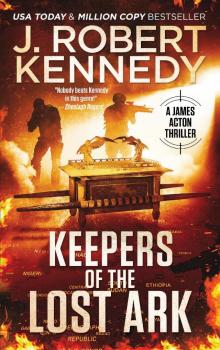 Keepers of the Lost Ark
Keepers of the Lost Ark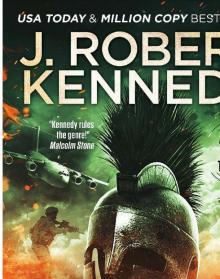 The Cylon Curse
The Cylon Curse The Colonel's Wife
The Colonel's Wife The Nazi's Engineer
The Nazi's Engineer Saint Peter's Soldiers (A James Acton Thriller, Book #14)
Saint Peter's Soldiers (A James Acton Thriller, Book #14) Kill Chain
Kill Chain Rogue Operator
Rogue Operator Containment Failure (A Special Agent Dylan Kane Thriller, Book #2)
Containment Failure (A Special Agent Dylan Kane Thriller, Book #2) The Lazarus Moment
The Lazarus Moment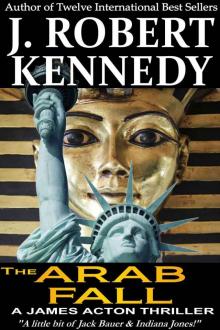 The Arab Fall (A James Acton Thriller, Book #6) (James Acton Thrillers)
The Arab Fall (A James Acton Thriller, Book #6) (James Acton Thrillers) Payback
Payback Flags of Sin - 05
Flags of Sin - 05 The Viking Deception
The Viking Deception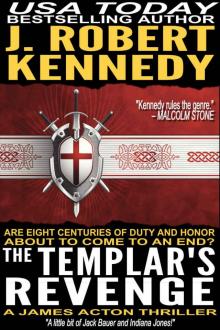 The Templar's Revenge (A James Acton Thriller, #19) (James Acton Thrillers)
The Templar's Revenge (A James Acton Thriller, #19) (James Acton Thrillers) Retribution - A Special Agent Dylan Kane Thriller Book #7
Retribution - A Special Agent Dylan Kane Thriller Book #7 Tick Tock (A Detective Shakespeare Mystery, Book #2)
Tick Tock (A Detective Shakespeare Mystery, Book #2) Blood Relics (A James Acton Thriller, #12)
Blood Relics (A James Acton Thriller, #12) The Templar Detective
The Templar Detective Cold Warriors (A Special Agent Dylan Kane Thriller, Book #3)
Cold Warriors (A Special Agent Dylan Kane Thriller, Book #3) Wages of Sin (A James Acton Thriller, #17) (James Acton Thrillers)
Wages of Sin (A James Acton Thriller, #17) (James Acton Thrillers) The Templar Detective and the Parisian Adulteress
The Templar Detective and the Parisian Adulteress Pompeii's Ghosts (A James Acton Thriller, #9)
Pompeii's Ghosts (A James Acton Thriller, #9) Raging Sun (A James Acton Thriller, #16) (James Acton Thrillers)
Raging Sun (A James Acton Thriller, #16) (James Acton Thrillers) The Riddle (A James Acton Thriller, Book #11)
The Riddle (A James Acton Thriller, Book #11)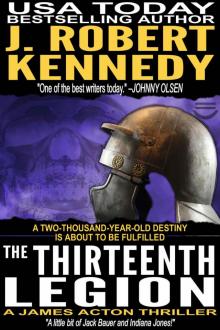 The Thirteenth Legion (A James Acton Thriller, #15) (James Acton Thrillers)
The Thirteenth Legion (A James Acton Thriller, #15) (James Acton Thrillers) Wrath of the Gods (A James Acton Thriller, #18) (James Acton Thrillers)
Wrath of the Gods (A James Acton Thriller, #18) (James Acton Thrillers) Sins of the Titanic (A James Acton Thriller, #13)
Sins of the Titanic (A James Acton Thriller, #13) Amazon Burning (A James Acton Thriller, #10)
Amazon Burning (A James Acton Thriller, #10)